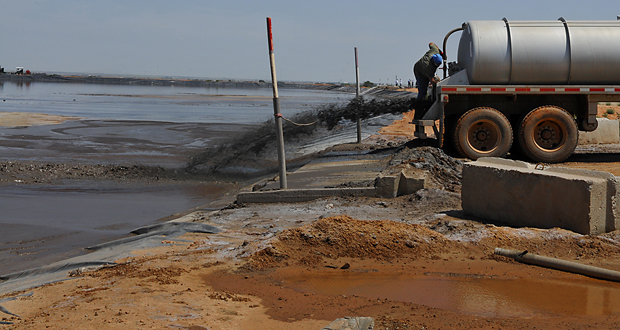ENID – Clarence Leschied said he needed to remain relevant to his oil and gas clients during the industry’s downturn. The management consultant with Nemaha Environmental said he found an opportunity to expand his business by partnering with another company and improving his operations.
Nemaha Environmental operates an oil wastewater disposal well and the Gray Mud drilling mud disposal pit north of Enid. As oil and gas companies drill less, they also produce less waste. Disposal is down 90 percent from the company’s peak in 2014. That lowered Leschied’s revenue.
So he bought an industrial centrifuge machine, tanks and other equipment to squeeze out more oil from the wastewater he takes from drillers. The process is fairly common when refining vegetable oil, and is also used in mining.
The process separates sediment from the salty oil wastewater. What’s left is placed into a centrifuge. The spinning separates petroleum floating on top of the wastewater, breaking up the emulsion. The crude can then be sold to pipeline companies or refineries. Wastewater is injected into the company’s disposal well, and solid material is deposited into the pit or cleaned up and reused in road materials.
It’s common for disposal companies to get a little bit of crude from tanker trucks, and then sell that petroleum. This process is more efficient than the traditional method, in which materials settle out over time and equipment heats and separates oil and water, Leschied said.
He is partnering with a Tulsa-based pipeline and disposal company, Lakewood Midstream. That allows both companies to expand their clientele, and Nemaha Environmental can reach a wider market of crude buyers. Lakewood Midstream gets access to a disposal facility in northern Oklahoma, which reduces miles driven to another facility in Grady County. Lakewood Midstream spokeswoman Liz Barclay said the partnership allows her company more options to serve its existing customers.
The companies will remain separate but have a revenue-sharing agreement. Leschied declined to provide details on the financial arrangement.
Enid Regional Development Alliance Chairman Tom Evans said although the downturn hurts some businesses, others can find opportunities for growth. The down cycle can also weed out weaker companies with too much debt, while other businesses that saved can expand. It’s great that companies like Nemaha Environmental are diversifying their operations, he said.
“Enid is an entrepreneurial town, and people here seem to rise up and get things done,” Evans said. “This is evidence of what a company has to do to survive until things turn around.”
Leschied said the hardest part of his expansion was finding the equipment. It’s typically tricky to find an industrial centrifuge used or on sale, because those machines are used in other, non-cyclical industries. He bought one for about $250,000 in January. He spent less than $1 million on the equipment upgrades. The new process has been operational for about one month.
It’s hard to predict exactly when he’ll get a return on his investment, because it depends on how much wastewater he gets from customers and variable commodity prices. At $45 per barrel, he could recoup the money he spent in less than three years, he said.
“It was tough to make an investment, but I’m confident it was the right move,” Leschied said.
Story provided by: Journal Record


